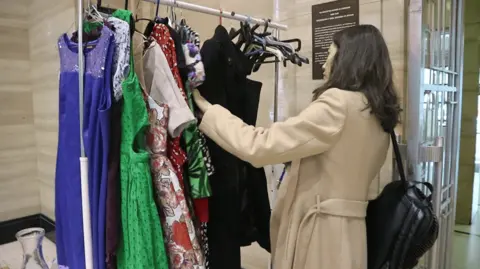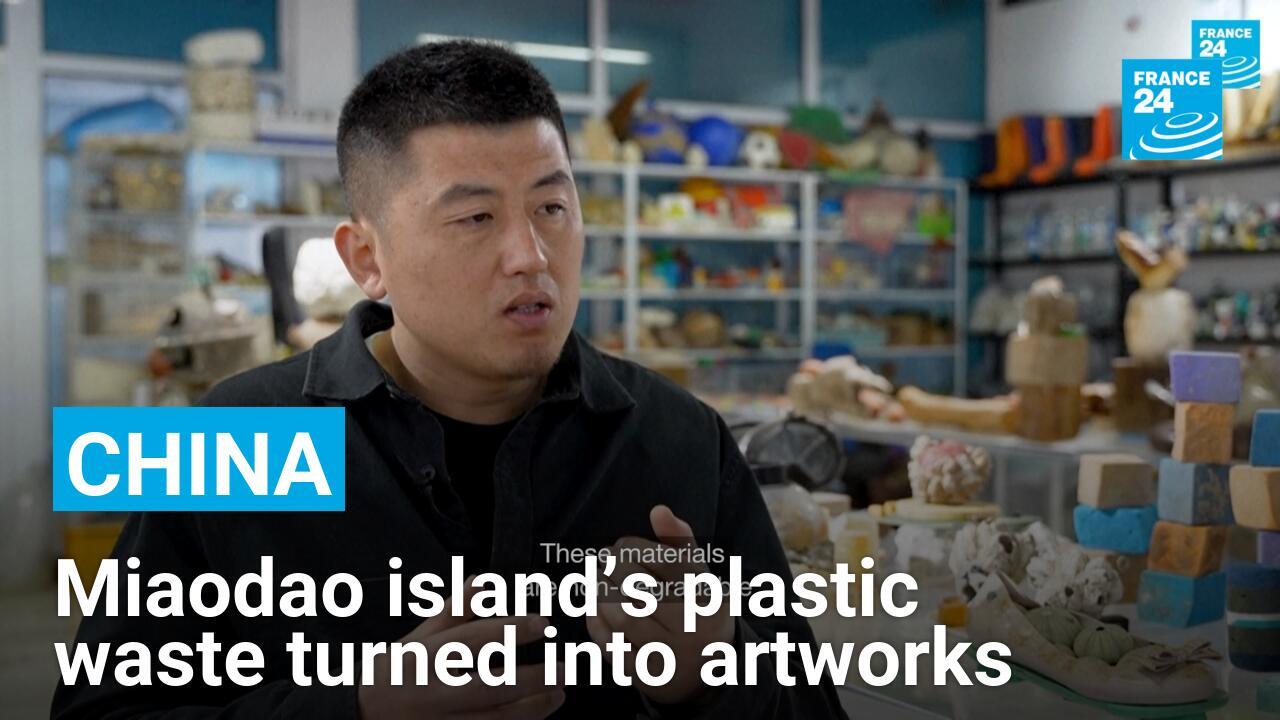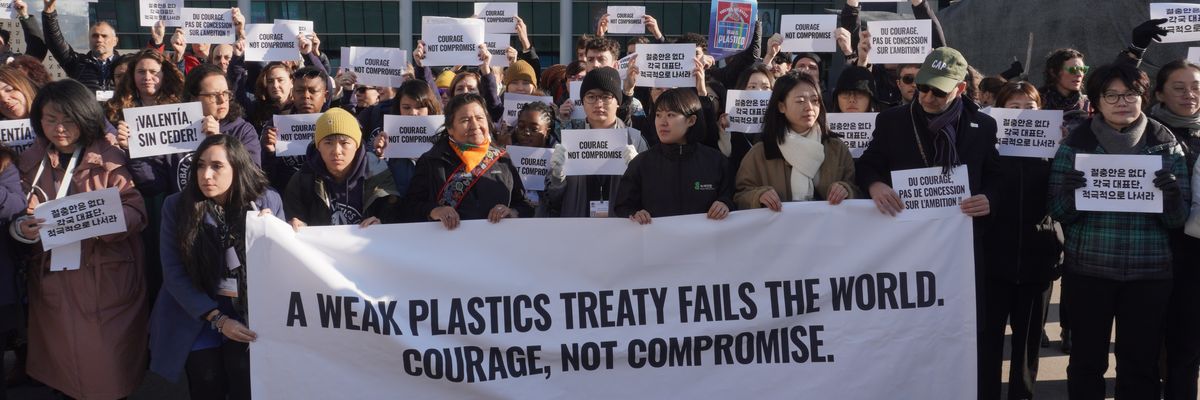Planetary boundaries: Confronting the global crisis of land degradation; Potsdam institute report opens UNCCD COP 16
Land degradation undermining Earth’s capacity to sustain humanity; Failure to reverse it will pose challenges for generations; 7 of 9 planetary boundaries are negatively impacted by unsustainable land use, highlighting land’s central role in Earth sys
United Nations Convention to Combat Desertification (UNCCD)
image:
The report, Stepping back from the precipice: Transforming land management to stay within planetary boundaries, produced at the Potsdam Institute for Climate Impact Research in collaboration with the UN Convention to Combat Desertification, is launched as nearly 200 member states begin the UNCCD COP16 summit in Riyadh, Saudi Arabia.
view more
Credit: PIK/UNCCD
Riyadh, Saudi Arabia – A major new scientific report charts an urgent course correction for how the world grows food and uses land in order to avoid irretrievably compromising Earth’s capacity to support human and environmental wellbeing.
Produced under the leadership of Prof. Dr. Johan Rockström at the Potsdam Institute for Climate Impact Research (PIK) in collaboration with the UN Convention to Combat Desertification (UNCCD), the report is launched as nearly 200 UNCCD member states kick off their COP 16 summit on Monday in Riyadh, Saudi Arabia.
Land is the foundation of Earth’s stability, regulating climate, preserving biodiversity and maintaining freshwater systems. It provides life-giving resources including food, water and raw materials, says the report, Stepping back from the precipice: Transforming land management to stay within planetary boundaries, which draws on roughly 350 information sources(*) to examine land degradation and opportunities to act from a planetary boundaries perspective.
Deforestation, urbanization and unsustainable farming, however, are causing global land degradation at an unprecedented scale, threatening not only different Earth system components but human survival itself.
Moreover, the deterioration of forests and soils undermines Earth’s capacity to cope with the climate and biodiversity crises, which in turn accelerate land degradation in a vicious, downward cycle of impacts.
“If we fail to acknowledge the pivotal role of land and take appropriate action, the consequences will ripple through every aspect of life and extend well into the future, intensifying difficulties for future generations,” said UNCCD Executive Secretary Ibrahim Thiaw.
Already today, land degradation disrupts food security, drives migration, and fuels conflicts.
The global area impacted by land degradation – approx. 15 million km², more than the entire continent of Antarctica or nearly the size of Russia – is expanding each year by about a million square km.
Planetary boundaries
The report, available for download post-embargo at www.unccd.int and https://bit.ly/3V5SaY7, situates both problems and potential solutions related to land use within the scientific framework of the planetary boundaries, which has rapidly gained policy relevance since its unveiling 15 years ago.
The planetary boundaries define nine critical thresholds essential for maintaining Earth’s stability. How humanity uses or abuses land directly impacts seven of these, including climate change, species loss and ecosystem viability, freshwater systems, and the circulation of naturally occurring elements nitrogen and phosphorus. Change in land use is also a planetary boundary.
Alarmingly, six boundaries have already been breached to date, and two more are close to their thresholds: ocean acidification and the concentration of aerosols in the atmosphere. Only stratospheric ozone – the object of a 1989 treaty to reduce ozone-depleting chemicals – is firmly within its “safe operating space”.
“The aim of the planetary boundaries framework is to provide a measure for achieving human wellbeing within Earth’s ecological limits,” said Johan Rockström, lead author of the seminal study introducing the concept in 2009.
“We stand at a precipice and must decide whether to step back and take transformative action, or continue on a path of irreversible environmental change,” he adds.
The benchmark for land use, for example, is the extent of the world’s forests before significant human impact. Anything above 75% keeps us within safe bounds, but forest cover has already been reduced to only 60% of its original area, according to the most recent update of the planetary boundaries framework by Katherine Richardson and colleagues.
Until recently, land ecosystems absorbed nearly one third of human-caused CO₂ pollution, even as those emissions increased by half.
Over the last decade, however, deforestation and climate change have reduced by 20% the capacity of trees and soil to absorb excess CO₂.
Unsustainable agricultural practices
Conventional agriculture is the leading culprit of land degradation, contributing to deforestation, soil erosion and pollution. Unsustainable irrigation practices deplete freshwater resources, while excessive use of nitrogen- and phosphorus-based fertilizers destabilize ecosystems.
Degraded soils lower crop yields and nutritional quality, directly impacting the livelihoods of vulnerable populations. Secondary effects include greater dependency on chemical inputs and increased land conversion for farming.
The infamous Dust Bowl of the 1930s resulted from large-scale land-use changes and inadequate soil conservation.
Land degradation hotspots today stem from intensive agricultural production and high irrigation demands, particularly in dry regions such as South Asia, northern China, the US High Plains, California, and the Mediterranean.
Meanwhile, climate change – which has long since breached its own planetary boundary – accelerates land degradation through extreme weather events, prolonged droughts, and intensified floods. Melting mountain glaciers and altered water cycles heighten vulnerabilities, especially in arid regions.
Rapid urbanization intensifies these challenges, contributing to habitat destruction, pollution, and biodiversity loss.
The impacts of land degradation hit tropical and low-income countries disproportionately, both because they have less resilience and because impacts are concentrated in tropical and arid regions. Women, youth, Indigenous peoples, and local communities also bear the brunt of environmental decline. Women face increased workloads and health risks, while children suffer from malnutrition and educational setbacks.
Weak governance and corruption exacerbate these challenges. Corruption fosters illegal deforestation and resource exploitation, perpetuating cycles of degradation and inequality.
According to the Prindex initiative, nearly one billion people lack secure land tenure, with the highest concentration in north Africa (28%), sub-Saharan Africa (26%), as well as South and Southeast Asia. The fear of losing one’s home or land undermines efforts to promote sustainable practices.
Agricultural subsidies often incentivize harmful practices, fueling overuse of water and biogeochemical imbalances. Aligning these subsidies with sustainability goals is critical for effective land management.
From 2013 to 2018, more than half-a-trillion dollars were spent on such subsidies across 88 countries, a report by FAO, UNDP and UNEP found in 2021. Nearly 90% went to inefficient, unfair practices that harmed the environment, according to that report.
Transformative action
Transformative action to combat land degradation is needed to ensure a return to the safe operating space for the land-based planetary boundaries. Just as the planetary boundaries are interconnected, so must be the actions to prevent or slow their transgression.
Principles of fairness and justice are key when designing and implementing transformative actions to stop land degradation, ensuring that benefits and burdens are equitably distributed.
Agriculture reform, soil protection, water resource management, digital solutions, sustainable or “green” supply chains, equitable land governance along with the protection and restoration of forests, grasslands, savannas and peatlands are crucial for halting and reversing land and soil degradation.
Regenerative agriculture is primarily defined by its outcomes, including improved soil health, carbon sequestration and biodiversity enhancement. Agroecology emphasises holistic land management, including the integration of forestry, crops and livestock management.
Woodland regeneration, no-till farming, nutrient management, improved grazing, water conservation and harvesting, efficient irrigation, intercropping, organic fertiliser, improved use of compost and biochar – can all enhance soil carbon and boost yields.
Savannas are under severe threat from human-induced land degradation, yet are essential for ecological and human wellbeing. A major store of biodiversity and carbon, they cover 20% of the Earth’s land surface but are increasingly being lost to cropland expansion and misguided afforestation.
The current rate of groundwater extraction exceeds replenishment in 47% of global aquifers, so more efficient irrigation is crucial to reduce agricultural freshwater use.
Globally, the water sector must continue to shift from “grey” infrastructure (dams, reservoirs, channels, treatment plants) to “green” (reforestation, floodplain restoration, forest conservation or recharging aquifers).
More efficient delivery of chemical fertilizer is likewise essential: currently, only 46% of nitrogen and 66% of phosphorus applied as fertilizer is taken up by crops. The rest runs off into freshwater bodies, and coastal areas with dire consequences for the environment.
New technologies
New technologies coupled with big data and artificial intelligence have made possible innovations such as precision farming, remote sensing and drones that detect and combat land degradation in real time. Benefits likewise accrue from the precise application of water, nutrients and pesticides, along with early pest and disease detection.
Plantix, a free app available in 18 languages, can detect nearly 700 pests and diseases on more than 80 different crops. Improved solar cookstoves can provide households with additional income sources and improve livelihoods, while reducing reliance on forest resources.
Regulatory action, stronger land governance, formalisation of land tenure and better corporate transparency on environmental impacts are all needed as well.
Numerous multilateral agreements on land-system change exist but have largely failed to deliver. The Glasgow Declaration to halt deforestation and land degradation by 2030 was signed by 145 countries at the Glasgow climate summit in 2021, but deforestation has increased since then.
Protecting intact peatlands and rewetting 60% of those already degraded could transform such ecosystems into a net sink, or sponge, of greenhouse gases by the end of the century. Currently, damaged peatlands account for 4% to 5% of global GHG emissions, according to the IUCN.
(*) Please see report for complete references
By the Numbers: Recent research highlights
- 7 out of 9: Planetary boundaries impacted by land use, underscoring its central role in Earth systems.
- 60%: Remaining global forest cover—well below the safe boundary of 75%.
- 15 million km²: Degraded land area, more than the size of Antarctica, expanding by 1 million km² annually.
- 20%: Earth’s land surface covered by savannas, now under threat from cropland expansion and ill-conceived afforestation.
- 46%: Global land area classified as drylands, home to a third of humanity; 75% of Africa is dryland.
- 90%: Share of recent deforestation directly caused by agriculture—dominated by expanding cropland in Africa/Asia, livestock grazing in South America.
- 80%: Agriculture’s contribution to global deforestation; 70% of freshwater use.
- 23%: Greenhouse gas emissions stemming from agriculture, forestry, and land use.
- 50% vs. 6%: Share of agricultural emissions from deforestation in lower-income vs. higher-income countries.
- 46% / 66%: Fertilizer efficiency for nitrogen and phosphorus; the rest runs off with dire consequences.
- 2,700+: National policies addressing nitrogen pollution while phosphorus is largely overlooked.
- 10%: World’s arable land planted with genetically modified crops by 2018—dominated by soy (78%), cotton (76%), and maize (30%).
- 11,700 years: Length of the Holocene period, during which Earth’s temperature varied within a narrow 0.5°C range—until a 1.3°C rise since the mid-19th century.
- 1/3: Anthropogenic CO2 absorbed by land ecosystems annually.
- 25%: Share of global biodiversity found in soil.
- 20%: Decline in trees’ and soil’s CO2 absorption capacity since 2015 attributed to climate change.
- 3%: Freshwater share of Earth’s water, mostly locked in ice caps and groundwater.
- 50%+: World’s major rivers disrupted by dam construction.
- 47%: Aquifers being depleted faster than they replenish.
- 1 billion: People with insecure land rights, fearing loss of home or land (e.g., 28% in MENA, 26% in sub-Saharan Africa).
- 1 in 5: People worldwide who paid bribes for land services in 2019—rising to 1 in 2 in sub-Saharan Africa.
- $500B+ (2013–2018): Agricultural subsidies across 88 countries, 90% of which fueled inefficient, harmful practices.
- $200B/year: Public and private finance for nature-based solutions, dwarfed by $7 trillion/year financing environmental harm.
- 145: nations that pledged in 2021 to halt deforestation by 2030; forest loss has since continued.
* * * * *
COP 16, Riyadh, Saudi Arabia: 2-13 December 2024.
Theme: “Our Land, Our Future” www.unccd.int/cop16
The 16th session of the Conference of the Parties (COP 16) of the United Nations Convention to Combat Desertification (UNCCD) will take place in Riyadh, Saudi Arabia, from 2 to 13 Dec. 2024.
The COP is the main decision-making body of UNCCD’s 197 Parties – 196 countries and the European Union.
UNCCD is the global voice for land and one of the three major UN treaties known as the Rio Conventions, alongside climate and biodiversity, which recently concluded their COP meetings in Baku, Azerbaijan and Cali, Colombia respectively.
Coinciding with the 30th anniversary of UNCCD, COP 16 will be the largest UN land conference to date, and the first UNCCD COP held in the Middle East and North Africa region, which knows first-hand the impacts of desertification, land degradation and drought.
COP 16 marks a renewed global commitment to accelerate investment and action to restore land and boost drought resilience for the benefit of people and planet.
COP 16 early news highlights include the following:
- Special Report on Land: Johan Rockstrom, Director, Potsdam Institute for Climate Impact Research (PIK) (2 Dec)
- Riyadh Global Drought Resilience Partnership launch (2 Dec)
- International Drought Resilience Observatory launch (2 Dec)
- Global Drought Atlas launch (2 Dec)
- Report launch: Investing in Land’s Future: Assessing Financing Needs for Land Restoration and Drought Resilience (3 Dec)
Ministerial dialogues:
- Policy instruments for proactive drought management (2 Dec)
- Unlocking public and private finance for land restoration and drought resilience (3 Dec), and
- Impacts of land degradation and drought on forced migration, security and prosperity (3 Dec)
Full COP 16 overview schedule, negotiation track, and action agenda: unccd.int/media/50289/ope









.jpg)


.jpg)











